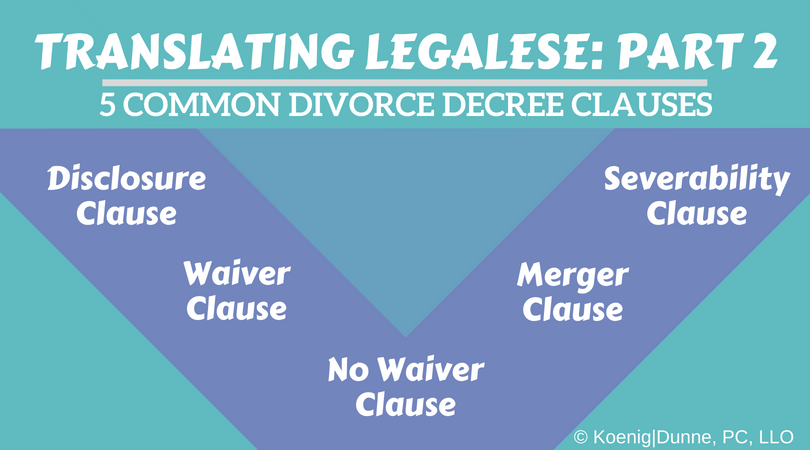A divorce decree is a court order that officially ends a marriage. In doing so, the decree defines the division of property between spouses, awards legal and physical custody of minor children, and states whether either spouse owes a child support obligation. Most decrees are written by attorneys, capturing the settlement agreements reached between spouses. These types of decrees are commonly referred to as consent decrees because both spouses consented to their contents as opposed to a judge authoring the decree after a trial.
Some of the clauses contained in a divorce decree can be difficult to understand. Here are five common divorce decree clauses translated from “legalese”:
Disclosure Clauses
Most consent decrees contain disclosure clauses, which state that you and your spouse have fully informed one another of the property you own. This complete exchange of information is vital, because without full disclosure, a spouse may claim that they were deceived into agreement and ask for the decree to be undone at a later date.
Waiver Clauses
During the course of your divorce, you are entitled to exercise certain legal rights such as the right to a trial, the right to receive information from the other spouse, and the right to have an attorney. Waiver clauses confirm that spouses knew of these rights and chose not to use them—which may be advisable in certain situations. Discuss with your attorney your rights and why you may decide not to exercise them.
No Waiver Clauses
If your spouse fails to comply with your divorce decree and you take no action to remedy this situation, a court could later decide that your inaction was in fact an agreement to allow your spouse to deviate from the decree. No waiver clauses tell courts to not interpret inaction as such an agreement.
Merger Clauses
In some divorces, a court will have issued a number of orders before entering the final decree. These orders may decide temporary possession of the marital residence, temporary spousal or child support, and/or temporary restraints. Merger clauses define whether these previous orders remain effective by being included in the decree or whether they are extinguished by being excluded from the decree.
Severability Clauses
The law constantly changes. And sometimes these changes may invalidate certain parts of your decree. Severability clauses ensure that if ever a part of your decree becomes invalidated because of a change in the law that only that part of the decree is affected, as opposed to the entire decree. For example, if the law changes tomorrow to say that no divorce decree ever entered may award shoes between spouses, then your award of Dorothy’s ruby-red slippers may be invalid, but because of your decree’s severability clause, your award of Dorothy’s house should remain unaffected.
The clauses in a divorce decree can be difficult to understand for even the most sophisticated of spouses. Your legal team here at Koenig|Dunne is experienced in drafting divorce decrees and is here to help you understand their complexities.

